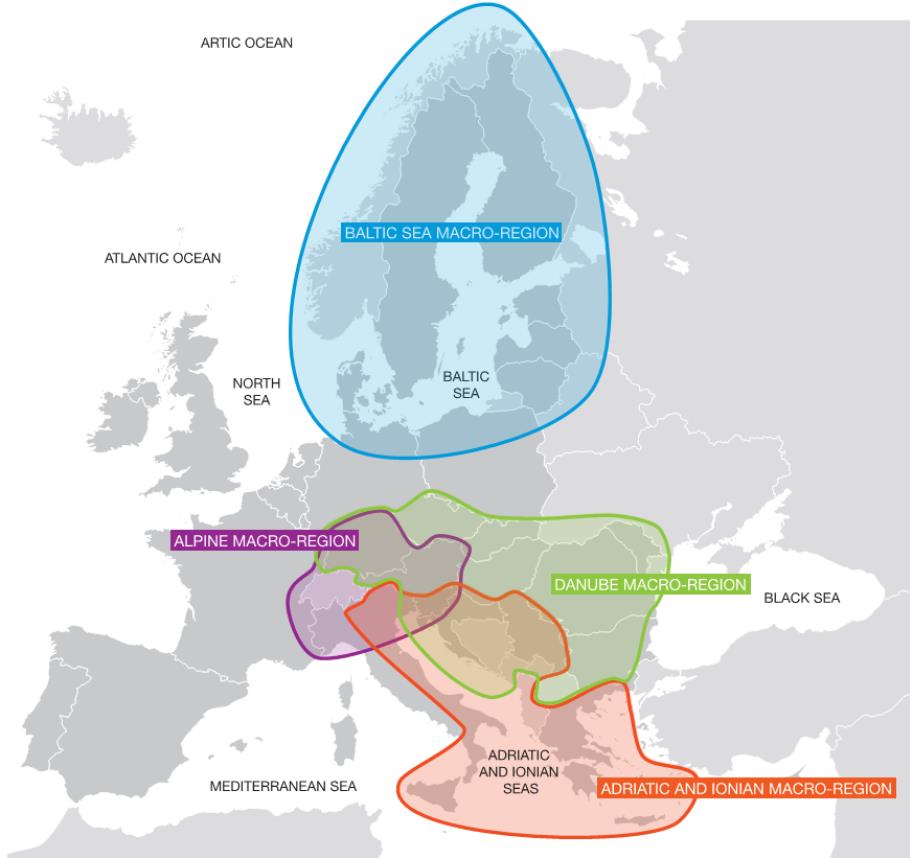The European Commission has adopted the 5th biennial report on the implementation of the EU macro-regional strategies. The report mentions that the European House Budapest successfully initiated the setting up of an inclusive macro-regional civil society organisations network in 2024.
The 5th Report on EU Macro-Regional Strategies covers progress made from mid-2022 to mid-2024 by the EU Strategy for the Baltic Sea Region, the Danube Region, the Adriatic and Ionian Region, and the Alpine Region. The four existing Strategies encompass the territory of 19 EU Member States and 10 non-EU countries inhabited by approximately 360 million people.
The Commission’s report underscores the role of macro-regional strategies in fostering cooperation across borders to address shared challenges from demographic change and green transition to digital transformation. In a context shaped by geopolitical instability – particularly Russia’s ongoing war against Ukraine – the document also highlights how macro-regional strategies support EU enlargement and reinforce resilience at national and regional levels.
Key topics from the 5th report include:
- Strengthened focus on EU enlargement, particularly in the Danube and Adriatic-Ionian regions, by encouraging candidate countries to participate on an equal footing with member states.
- Delivery of core EU priorities, from green and digital transitions to social and territorial cohesion, including support for sustainable development, digital infrastructure, and fair economic transitions.
- Enhanced governance and implementation mechanisms, with emphasis on stakeholder engagement and flexibility in updating action plans in response to evolving needs.
- Greater attention to long-term strategic development, including energy transition, economic competitiveness, demographic challenges, and security.
The report stresses the need for macro-regional strategies to remain dynamic, inclusive, and better aligned with broader EU objectives. It calls for the involvement of regional and local authorities, civil society, youth, academia, and business in delivering future actions.
The Commission’s report specifically refers to the initiative of the European House Budapest: “Several countries have national and regional platforms to promote civil society participation in macro-regional strategies. However, the inclusion of civil society in strategy governance structures and other working bodies needs to be continuously strengthened and regularly followed up. In the process of articulating and strengthening the voice and involvement of civil society organisations, the European House Budapest successfully initiated the setting up of an inclusive macro-regional civil society organisations network in 2024. This new collaborative arrangement has a cross-macro-regional character and a strong advocacy function.”
Accompanied by a detailed Commission Staff Working Document, the report offers comprehensive insights into the progress of each strategy, and lays the groundwork for future improvements in monitoring, communication, and funding alignment.
EU Strategy for the Baltic Sea Region
- Maritime innovation: The Baltic Sea e-Nav project is creating cutting-edge navigational products to ensure safer and greener maritime transport.
- Youth engagement: The region hosts the Baltic Sea Youth Forum and created the Baltic Sea Youth Declaration with policy suggestions by young people.
- Resilience in small towns: Projects like BSR Cultural Pearls and BaMuR help boost social resilience and cultural identity in smaller municipalities.
- Digital leap: Focuses on digital infrastructure and skills development to improve competitiveness and efficiency across sectors.
EU Strategy for the Danube Region
- Environmental leadership: Living Rivers project restores river ecosystems and meets EU water and biodiversity targets.
- Circular economy pioneers: Plan-C brings 9 countries together to transform the plastics industry toward circularity.
- Youth empowerment: The Danube Youth Council and Danube Youth Organisation Network engage young people in shaping policies.
- Support to Ukraine: Played a key role in fostering cooperation with Ukraine and Moldova, including refugee support and post-war reconstruction.
EU Strategy for the Adriatic and Ionian Region
- Sustainable tourism: ADRIONCYCLETOUR promotes green travel via a cycling route connecting Italy, Slovenia, and Croatia.
- Health innovation: SI4CARE develops integrated healthcare systems for the ageing population with telemedicine pilots.
- Green ports: Hosted the Green and Smart Ports event in Trieste to promote sustainable port operations.
- Youth in focus: Established a Youth Council with two young representatives per country (ages 18–29) for inclusive policymaking.
EU Strategy for the Alpine Region
- Hydrogen future: AMETHyST supports green hydrogen ecosystems in the Alps to fuel a post-carbon transition.
- Smart villages: Championing rural innovation through the EU-wide “smart villages” concept.
- Youth first: The first EU macro-region to establish a Youth Council and run the Pitch Your Project contest.
- Communications upgrade: The redesigned EUSALP website now includes youth sections and complies with modern data protection standards.
The concluding part of the Report (The way forward) convincingly argues for the utilisation of the full potential of EU macro-regional strategies in building a prosperous, sustainable and secure Europe.
A comprehensive presentation of 5th biennial report on the implementation of the EU macro-regional strategies is organised by European House Budapest with the participation of Johan Magnusson, Team Leader and Senior Expert of DG Regio, European Commission on 11 June 2025. More information here.
